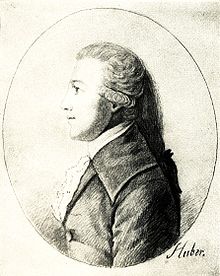Ludwig Ferdinand Huber
Ludwig Ferdinand Huber (born September 14, 1764 in Paris , † December 24, 1804 in Ulm ) was a German writer, translator and journalist during the Enlightenment and the French Revolution .
Life
Huber was born on September 14, 1764, the son of Michael Huber (1727-1804), who made the German literature of his era known in France. In his childhood he moved with his parents to Leipzig , where he learned new languages and literature and showed a particular interest in French and English literature. In Leipzig he made friends with Christian Gottfried Körner , the father of the poet Theodor Körner , got engaged in Dresden to Christian Körner's sister-in-law, the painter Dora Stock, and came into contact with Friedrich Schiller , who was one of Körner's closest friends and with him a lifelong friendship. In Leipzig he became a member of the Freemason Lodge Minerva to the three palms .
In 1785 he translated " The great day or Figaro's wedding " by Beaumarchais into German.
In 1787 he became secretary of the Saxon legation in Kurmainz , where he remained until the French occupation in 1792 . According to a secret report from the spring of 1792, Huber was one of the “ most excellent democrats and revolutionary councilors ” in Mainz , along with Georg Forster and Wilhelm Heinse . After the departure of his friend Forster, who had been sent to Paris as a deputy of the Republic of Mainz to promote the accession of the Republic of Mainz to the French Republic and had left his wife Therese and the rest of his family impoverished, Huber took care of it Family. In love with Forster's talented young wife, Huber gave up his diplomatic position and broke the engagement to Dora Stock. He moved with Therese Forster to Bôle in Neuchâtel and married Therese after Forster's death in 1794. During this time he was in close contact with the writer and Salonnière Isabelle de Charrière , who lived in nearby Colombier and took Forster's daughter Therese as a partner. During this time he translated works by Isabelle de Charrière and her student Isabelle de Gélieu into German and took care of their publication by Johann Friedrich Cotta .
In March 1798, Huber became deputy editor-in-chief of Cotta's political daily newspaper, Latest Weltkunde, in Tübingen . Because the newspaper was banned by the Viennese court for political reasons, Johann Friedrich Cotta published the newspaper in Stuttgart under the name Allgemeine Zeitung , now with Ludwig Ferdinand Huber as editor-in-chief. A conflict with the Duke of Württemberg meant that Cotta relocated the newspaper to Neu-Ulm in Bavaria in 1803 . The following year, Huber was appointed to the council for education in the newly created administrative district of Swabia of the Bavarian state. Shortly afterwards he died.
Fonts
- The secret court (Anonymous, no place or publisher 1791)
- Mixed writings by the author of the secret court (1793)
- Essays in the Peace Preliminaries (1794–1796) and in Klio (1795–1798)
- All works since 1802 , ed. by Therese Huber
- The great spectacle. Selected writings on the French Revolution , ed. by Sabine Dorothea Jordan (Stuttgart Theses on German Studies, No. 284, 1994).
Individual evidence
- ↑ quoted from: Mühlpfort, G., Vorboten der Mainzer Republik , in Bundesarchiv und Stadt Mainz (ed.): Deutsche Jakobiner, 1981, Volume 1, p. 114
literature
- Encyclopaedia Britannica 1911
- Sabine Dorothea Jordan: Ludwig Ferdinand Huber (1764–1804). His Life and Works . (Stuttgart Theses on German Studies, No. 57)
- Rudolf Elvers : Huber, Ludwig Ferdinand . In: Allgemeine Deutsche Biographie (ADB). Volume 13, Duncker & Humblot, Leipzig 1881, pp. 236-246.
- Wulf Segebrecht: Huber, Ludwig Ferdinand. In: New German Biography (NDB). Volume 9, Duncker & Humblot, Berlin 1972, ISBN 3-428-00190-7 , pp. 684 f. ( Digitized version ).
Web links
- Literature by and about Ludwig Ferdinand Huber in the catalog of the German National Library
- Works by and about Ludwig Ferdinand Huber in the German Digital Library
- Anne Hofmann: Ludwig Ferdinand Huber. In: Historical Lexicon of Switzerland .
| personal data | |
|---|---|
| SURNAME | Huber, Ludwig Ferdinand |
| BRIEF DESCRIPTION | German writer, translator and journalist |
| DATE OF BIRTH | September 14, 1764 |
| PLACE OF BIRTH | Paris |
| DATE OF DEATH | December 24, 1804 |
| Place of death | Ulm |

